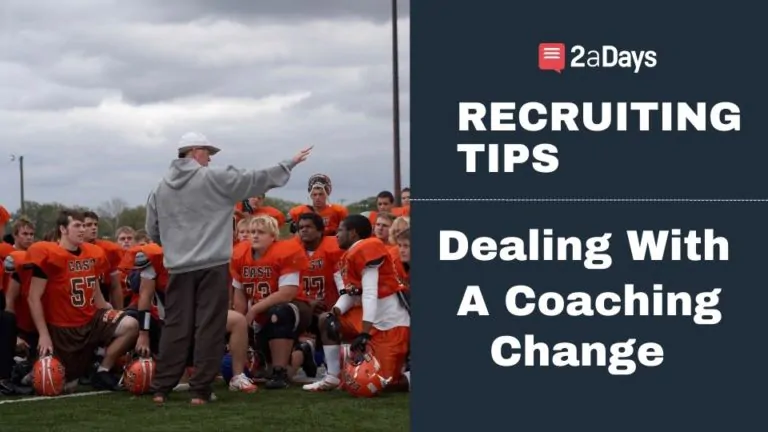Can you name one thing college athletes experience that is relatively common, but rarely talked about? If your answer was a coaching change, then bingo–you're right!
As an athlete, your coach leaving is probably one of the last things you think about during your college career. Unfortunately when this happens, it often comes with no warning, leaving athletes completely blindsided. As a former D1 athlete who has gone through this multiple times I can confirm that it absolutely sucks. But the good thing is, you'll live through it. Here's my experience with coaching changes, and how I was able to overcome and adapt them.
I am a recently retired swimmer. I swam competitively for 13 long years and loved (almost) every second of it. I went through 2 major coaching changes, and I actually learned alot from each experience. Here's Part One of my experience.
Related: Rate your Coaches, Facilities, and Campus Visits
Club Coaching Change
The first coaching change I went through happened when I was a freshman in high school. My club coach, who I had left my previous team to come train under, didn't show up to practice one day. My teammates and I didn't really think much of it until a coach we had never seen before arrived and asked if she could talk to us. She informed us that our coach had quit to pursue a different coaching position…at our rival team. We were all in complete shock. Initially I had no idea what to think or how to react. I had formed an extremely close bond with this coach who was like a second mother to me. She was also the reason I had started to thrive in the sport, and I trained and competed my best under her. I felt betrayed. She left with absolutely no hints, no goodbye, nothing at all. So, as one would do in a situation like this, I reacted reasonably when I finally grasped what was happening. I cried and cried and cried like the world was ending, and it truly felt like it. One of my core memories from that day was refusing to practice after learning the news and instead running outside of the aquatic center to call my mom, sobbing to her over the phone, and yelling “I don't know what to do, I don't know what to do!” over and over again.
Related: Head Coach Carousel: Dealing with Coach Turnover
Eventually when I calmed down and processed everything, I decided the best thing for me to do would be to follow my coach. Most of the other swimmers in my group were doing the same thing, so I was slightly influenced by them. But I also knew if I stayed I would probably not improve as much as I wanted to since the remaining coaches were nowhere as talented as her. At that point in my life, swimming in college was a dream of mine and I wouldn't be able to do it without her coaching skills. So, off I went to the team I had hated for most of my high school career.
The biggest challenge with moving teams is usually adapting. This team was much bigger, so I had to get used to practicing with 3 times the amount of people. Another one of my core memories is getting out in the middle of practice during my first week with the new team and crying to my coach about how hard it was to practice because there were these enormous waves being created by the amount of people in the pool. Getting used to my new teammates wasn't as hard, the swimming community is pretty small and everyone practically knows each other regardless of what team you're on. I had the comfort of my teammates who moved to follow my coach as well. Getting used to the new coaches was a bit difficult at first, but it didn't take too long. I was in a somewhat unique position which made it easier to warm up to one of them, because he had a pretty high status in the swimming world. He was Katie Ledecky's coach, so I was eager to learn from him and grateful that a change so terrible gave me such a valuable opportunity.
In the end I was grateful for this big and scary change. I met new people who became some of my closest friends during the time and I had the chance to train under multiple extremely talented coaches. I learned how to train at an even more elite level which I know in the end prepared me for college swimming.
Next week, I'll cover how I got through another coaching change…this time at the college level.
Have an idea for a story or a question you need answered? Want to set up an interview with us? Email us at [email protected]
* Originally published on August 11, 2022, by Sammie Grant







